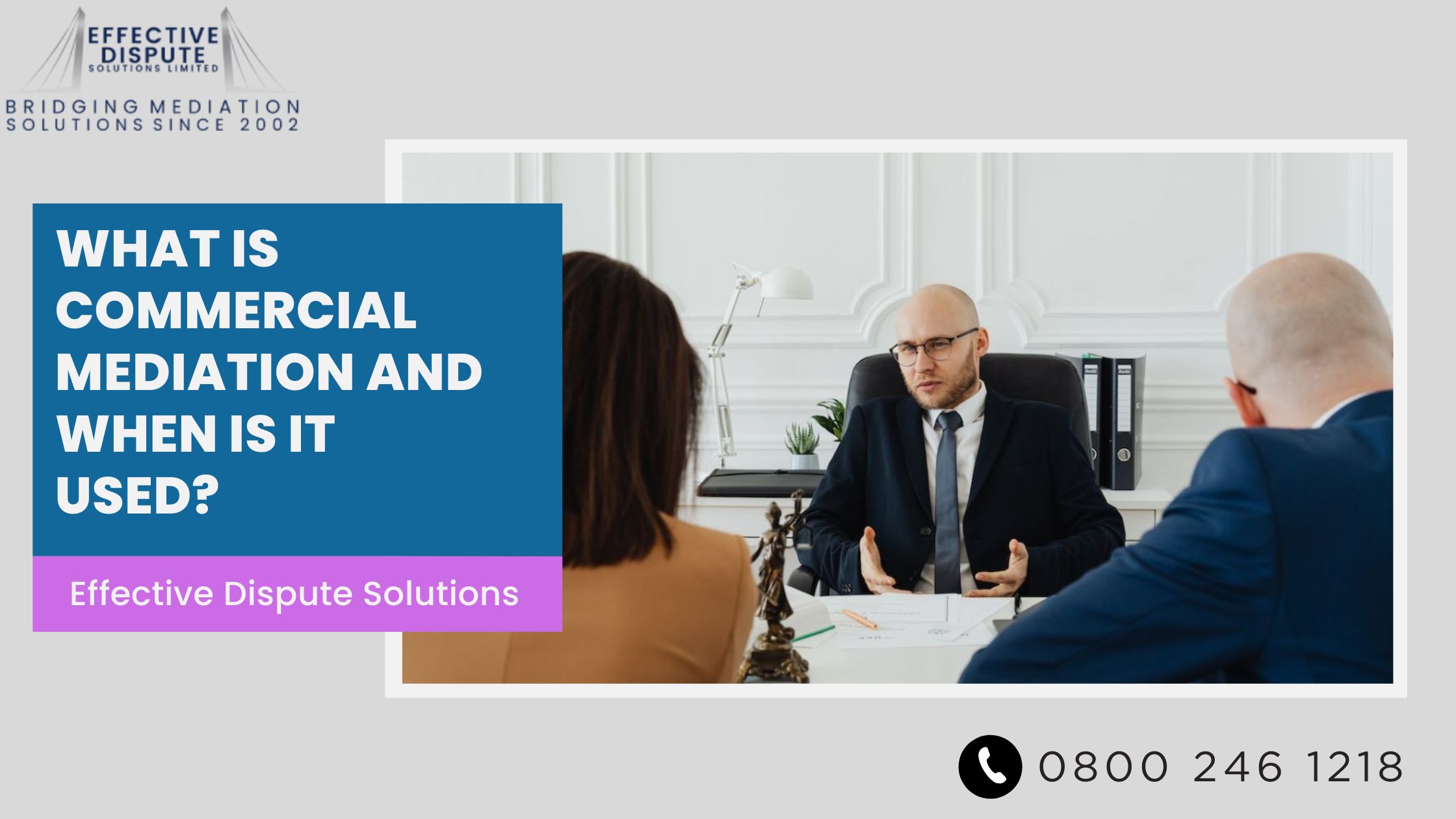Disagreements in business are common. Sometimes, they grow so big that talking it out just doesn’t work. When this happens, many people think of going to court. But there’s another way, a better way for many. It’s called commercial mediation.
This blog will explain what commercial mediation is, when to use it, and why it’s often a wise choice. We’ll use clear, simple language and real-life examples. By the end, you’ll understand how commercial mediation services can help solve business problems without all the stress and cost of a courtroom.
What Is Commercial Mediation?
Commercial mediation is a method for individuals and businesses to resolve disputes without resorting to court proceedings. It’s a process where a neutral person, called a mediator, helps both sides discuss their concerns. The mediator doesn’t take sides or make decisions. Instead, they guide the conversation so both parties can find a solution they agree on.
Think of the mediator as a referee in a game. They keep things fair and help everyone follow the rules, but they don’t pick a winner. The goal is for both sides to leave the table with an agreement that works for them.
Key Features of Commercial Mediation
- Voluntary: Both parties choose to participate in the process.
- Confidential: What’s said in mediation stays private & confidential.
- Flexible: The process is shaped to fit the needs of the people involved.
- Non-binding (initially): The outcome only becomes legally binding if both parties agree and sign a settlement agreement.
How Does Commercial Mediation Work?
The process of commercial mediation is designed to be simple and open. Here’s how it usually works:
- Choosing a Mediator: Both sides agree on a mediator with experience in the subject matter of their dispute. For example if you had a contract dispute, it would be sensible, but not necessary to choose a mediator with experience in contract, business disputes.
- Preparation: Each side explains their view of the problem. Alongside sharing, or referring to documents or facts they have previously disclosed to the mediator. For them to gain a better understanding.
- First Meeting: The mediator meets with both sides, in most cases this will be jointly. This may be separately on occasion. But there would need to be a good reason to meet separately.
- Discussion: The mediator helps everyone communicate, listen, and seek common ground.
- Finding Solutions: Both sides propose ways to address the issue. The mediator helps them see the best way to address all of their issues.
- Agreement: Once an agreement is reached, the solution is documented. Once signed, it becomes legally binding.
This process can happen in person, online, or even over the telephone. It’s all about what works best for the parties.
When to Use Commercial Mediation
Not every business disagreement needs a judge. Commercial mediation is best used when:
- Both sides want to resolve the issue quickly and discreetly.
- The dispute is hurting the business, but both parties want to continue working together.
- The issue concerns contracts, finances, partnerships, or property.
- Both sides are willing to engage in dialogue and seek a common ground.
Examples of when to use commercial mediation:
- Two companies disagree over a contract.
- Business partners have a falling out about profits.
- A supplier and a store argue about late deliveries.
- There’s a fight over intellectual property, like a logo or an invention.
If the problem is severe, such as fraud or criminal activity, mediation is not a suitable choice. However, for most business problems, commercial mediation services can be beneficial.
Benefits of Commercial Mediation
Why do so many businesses choose mediation over court litigation? Here are some of the main benefits of commercial mediation:
- Saves Money: Mediation costs much less than court litigation. There are fewer legal fees and less time away from work.
- Saves Time: Most mediations are completed in a matter of hours, at worst one whole day. Court cases drag on for months or even years. With the COVID-19 backlog, delays have increased even more.
- Confidential: Everything is private. This protects commercial business competition, sensitivity and reputations.
- Keeps Control: Both sides have a say in the outcome. In court, a judge decides for you.
- Preserves Relationships: Mediation is a less hostile approach. It helps people keep working together after the dispute, if that is an option.
- Flexible Solutions: The agreement can be tailored to meet the needs of both parties, providing a customised solution. Courts simply follow the law, following strict rules.
Commercial Mediation vs Litigation
Let’s compare commercial mediation vs litigation (going to court):
| Feature | Commercial Mediation | Litigation (Court) |
|---|---|---|
| Cost | Usually low | Often very high |
| Time | Quick (hours or one day) | Slow (months up to 1-3 years) |
| Privacy | Confidential | Public |
|
Control |
Parties decide | Judge decides |
|
Flexibility |
High |
Low |
| Relationship | Can be preserved | Damaged beyond repair |
| Outcome | Win-win | Win-lose |
Mediation works best when both sides want to talk and try to fix things. Litigation is needed if one side refuses to cooperate, or if the law must step in.
Types of Disputes Handled by Commercial Mediation Services
Commercial mediation services can help with many kinds of business problems, such as:
- Contract disputes
- Partnership disagreements
- Intellectual property issues (like patents or trademarks)
- Disputes with suppliers or customers
- Problems with leases or property
- Franchise disagreements
- Debt or payment issues
- Anything of a commercial nature
If you’re unsure if mediation is suitable for your dispute, just ask a mediator for advice.
What Happens If Mediation Fails?
Sometimes, mediation doesn’t end in agreement. That’s okay. You can still attend court if necessary. Nothing said in mediation can be used against you in court. You don’t lose your legal rights by trying mediation first. In fact the courts recommend you try mediation before you try court action.
Tips for Getting the Most from Commercial Mediation
- Be prepared: Know the facts and what you want.
- Be open: Listen to the other side and be willing to compromise.
- Be honest: Tell the truth about what happened and what you need.
- Stay calm: Even if you’re upset, try to keep emotions in check.
- Think long-term: Sometimes, keeping a good business relationship is worth more than “winning” the argument.
Who Can Be a Commercial Mediator?
Commercial mediators are trained to handle business disputes. They often have backgrounds in law, business, or finance. Many have specialised training and are accredited through organisations recognised by the Civil Mediation Council in the UK.
Some mediators even offer training for people who want to learn these skills. This can be particularly useful for solicitors, business owners, or anyone involved in commercial disputes.
Frequently Asked Questions
Question: Is commercial mediation legally binding?
Answer: Once all the parties to any dispute come to an agreement. The agreement will be put in writing. Once the parties sign this document, then the agreement made becomes legally binding. If there’s no agreement, then that is the end of the mediator’s input.
Question: Do I need a solicitor?
Answer: No, but it is always sensible to know where you stand legally.
Question: How long does mediation take?
Answer: Most mediations last a few hours, and no more than twelve hours. Therefore not more than one day. However long your mediation takes, it will always be resolved more quickly than going through court.
Question: Is mediation consistently successful?
Answer: No, but many disputes are settled. Even if you don’t agree on everything, you might solve part of the problem or understand each other better.
Conclusion
Commercial mediation is an innovative approach to resolving business issues. It’s private, quick, and gives everyone a say in the outcome. It saves money and helps maintain strong business relationships. If you’re facing a business dispute, think about using commercial mediation services before heading to court.
Remember, discussing things with the help of a neutral person can turn a big problem into a simple solution. That’s the real power of commercial mediation.


